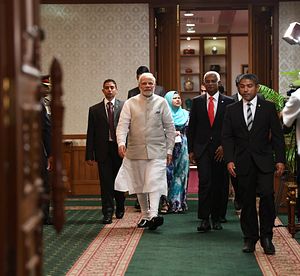This month will cast the spotlight on two important Indian neighborhood relationships with important summits slated to take place in New Delhi. First, on December 17, Ibrahim ‘Ibu’ Mohammed Solih, the new president of the Maldives, will visit India on his inaugural overseas trip after taking up the presidency on November 17. Second, at an unspecified time this month, the newly elected prime minister of Bhutan, Lotay Tshering, will visit India too.
Make no mistake: the state of India’s relations with the Maldives and Bhutan could not be more different, but the visits by both leaders will mark important new beginnings.
This is most perceptible with the Maldives, where Solih represents nothing short of a tectonic shift in the archipelagic state’s foreign policy outlook. During his inaugural address, Solih pledged to improve ties with India, which had frayed badly under his authoritarian-leaning predecessor Abdulla Yameen. For the first time in his term as India’s prime minister, Narendra Modi traveled to the Maldives to attend Solih’s inauguration. For New Delhi, Solih’s victory represents a major opportunity to recalibrate the relationship with a strategically important neighbor whose territory sits astride important and increasingly contested sea lanes in the Indian Ocean.
Much of the recalibration with the Maldives will be about China—if not explicitly, then implicitly. Solih is the latest Indo-Pacific leader to follow a predecessor who’d taken on massive amounts of debt from China. The numbers in the Maldives are fuzzy, but the country may have taken on as much as $3 billion in Chinese debt during Yameen’s tenure, eclipsing all its other foreign debts. Solih has promised to roll back what he can, including the Maldives-China Free Trade Agreement that Yameen pushed through the country’s legislature in December 2017 with hardly any debate. When Solih comes to New Delhi, he’ll need assurances, however, that India can deliver benefits. But, for the Maldives, all signs point to a switch over from the “China first” policies of the last few years to the “India first” approach that defined much of its history as an independent country in the 20th century and early 21st century.
With Bhutan, while the broader bilateral relationship has been more stable, New Delhi will be looking to ensure that the overall cadence of the relationship is maintained under the new government. (Bhutan, since 2008, is a constitutional monarchy, with powers apportioned between the king and the democratically elected government.) After the 2017 Doklam standoff between Indian and Chinese troops over a piece of territory disputed by China and Bhutan, the issue of Bhutan’s perceived sovereignty and independence overall from India rose to the fore in the lead up to the 2018 National Assembly elections.
From the Bhutanese side, the perspective that India remains the country’s most important partner is unlikely to change. A recent interview in The Hindu with the country’s new foreign minister makes it clear that there won’t be a recalibration of Bhutan’s old policy of maintaining close ties with India. Foreign Minister Tandi Dorji notes that “We will continue to build on that policy, with India as the cornerstone of our foreign policy.”
During the upcoming prime ministerial visit, the two sides will likely spend less time on strategic issues and spend more energy discussing a major hydropower project that India is expected to commission in Bhutan. Indian Foreign Secretary Vijay Gokhale noted on Tuesday that India hopes to “commission the flagship 750-megawatt Mangdechhu hydropower project, hopefully this month itself.” Bhutan is already a major exporter of energy to India and the new hydropower project will expand that capacity. India’s current priorities in the country focus on expanding trade and connectivity.

































